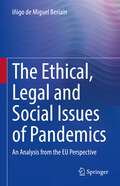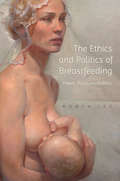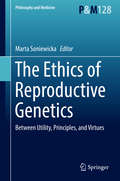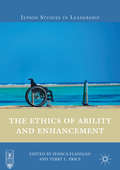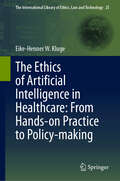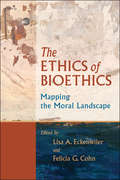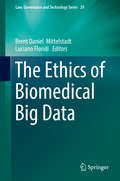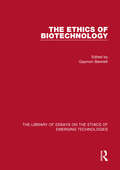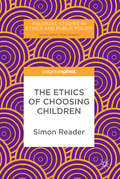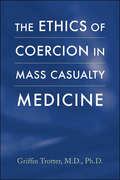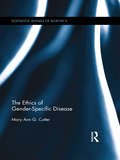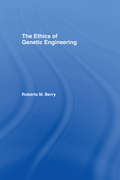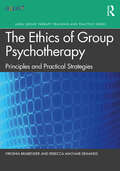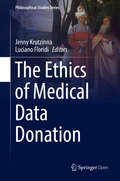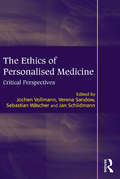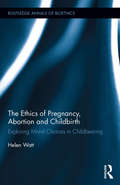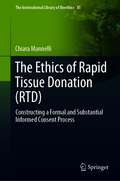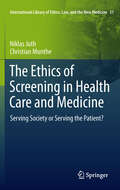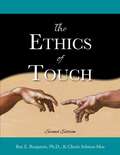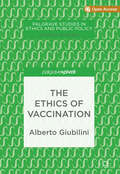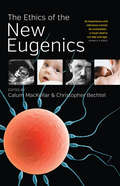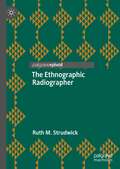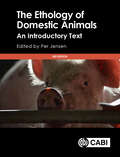- Table View
- List View
The Ethical, Legal and Social Issues of Pandemics: An Analysis from the EU Perspective
by Iñigo de Miguel BeriainThis book proposes an ethical and legal framework to improve the responses to social issues related not only to the current SARS-CoV-2 pandemic, but also to future pandemics. Its contents cover the issues that are likely to be most controversial in any public health crisis. It starts by discussing non-pharmacological measures, such as the appropriateness of confinement, how to control compliance with public health measures and the ethical, legal and social acceptability of health certificates. Then it turns to issues related to the production, distribution and administration of vaccines, with a particular focus on the design and implementation of vaccination policies. Finally, it analyses the most appropriate criteria to develop a triage, when the situation brings us to this terrible scenario. The analyses presented in this book are based on the ethical and legal frameworks, as well as the social context, of the European Union, and aims to address the main dilemmas faced by any liberal democracy dealing with a pandemic: how to reconcile the defense against a public health crisis together with a respect for fundamental rights and freedoms. The European legal systems have developed a number of conceptual tools designed to ensure that there is no room for arbitrariness in the restrictions introduced by the political power in emergency situations, and this book builds upon these tools. The Ethical, Legal and Social Issues of Pandemics: An Analysis from the EU Perspective is a predominantly practice-oriented book, which will help policy makers to adopt policies that effectively combine public health needs with individual rights and freedoms. It will also help health care givers to understand better the ethical and legal issues involved in their work and citizens, in general, to participate in public decision making in an informed manner. Finally, it will help to design tools that faithfully comply with existing fundamental rights standards.
The Ethics and Politics of Breastfeeding: Power, Pleasure, Poetics
by Robyn LeeResponding to the most widely read breastfeeding manual, La Leche League’s The Womanly Art of Breastfeeding, Robyn Lee’s The Ethics and Politics of Breastfeeding explores breastfeeding as an art that must be developed through skillful application of effort and distinguished from a merely natural or physiological process. The Ethics and Politics of Breastfeeding challenges the dominant understanding of breastfeeding and cultivates an alternative conception as an ethical, embodied practice of the self. Drawing on the work of Michel Foucault, Emmanuel Levinas, and Luce Irigaray, Lee develops a new understanding of breastfeeding as an "art of living," where the practice is reconsidered in the light of ongoing social inequalities.
The Ethics of Reproductive Genetics: Between Utility, Principles, And Virtues (Philosophy and Medicine #128)
by Marta SoniewickaThis book is aimed at analyzing the foundations of medical ethics by considering different moral theories and their implications for judgments in clinical practice and policy-making. It provides a review of the major types of ethical theory that can be applied to medical and bioethical issues concerning reproductive genetics. In response to the debate on the most adequate ethical doctrine to guide biomedical decisions, this book formulates views that capture the best elements in each, bearing in mind their differences and taking into account the specific character of medicine. No historically influential position in ethics is by itself adequate to be applied to reproductive decisions. Thus, this book attempts to offer a pluralistic approach to biomedical research and medical practice. One usually claims that there are some basic principles (non-maleficence, beneficence, confidentiality, autonomy, and justice) which constitute the foundations of bioethics and medical ethics. Yet these principles conflict with each other and one needs some criteria to solve these conflicts and to specify the scope of application of these principles. Exploring miscellaneous ethical approaches as introduced to biomedicine, particularly to reproductive genetics, the book shall elucidate their different assumptions concerning human nature and the relations between healthcare providers, recipients, and other affected parties (e.g. progeny, relatives, other patients, society). The book attempts to answer the question of whether the tension between these ethical doctrines generates conflict in the field of biomedicine or if these competing approaches could in some way complement each other. In this respect, lecturers and researchers in bioethics would be interested in this reading this book.
The Ethics of Ability and Enhancement
by Terry L. Price Jessica FlaniganThis book explores our ethical responsibilities regarding health in general and disabilities in particular. Disability studies and human enhancement stand out as two emerging areas of research in medical ethics, prompting debates into ethical questions of identity, embodiment, discrimination, and accommodation, as well as questions concerning distributive justice and limitations on people's medical rights. Edited by two ethicist philosophers, this book combines their mastery of the theoretical debates surrounding disability and human enhancement with attention to real world questions that health workers and patients may face. By including a wide range of high-quality voices and perspectives, the book provides an invaluable resource for scholars who are working on this important and emerging area of leadership and health care ethics.
The Ethics of Animal Research: Exploring the Controversy (Basic Bioethics)
by Jeremy R. GarrettA balanced, accessible discussion of whether and on what grounds animal research can be ethically justified.An estimated 100 million nonhuman vertebrates worldwide—including primates, dogs, cats, rabbits, hamsters, birds, rats, and mice—are bred, captured, or otherwise acquired every year for research purposes. Much of this research is seriously detrimental to the welfare of these animals, causing pain, distress, injury, or death. This book explores the ethical controversies that have arisen over animal research, examining closely the complex scientific, philosophical, moral, and legal issues involved.Defenders of animal research face a twofold challenge: they must make a compelling case for the unique benefits offered by animal research; and they must provide a rationale for why these benefits justify treating animal subjects in ways that would be unacceptable for human subjects. This challenge is at the heart of the book. Some contributors argue that it can be met fairly easily; others argue that it can never be met; still others argue that it can sometimes be met, although not necessarily easily. Their essays consider how moral theory can be brought to bear on the practical ethical questions raised by animal research, examine the new challenges raised by the emerging possibilities of biotechnology, and consider how to achieve a more productive dialogue on this polarizing subject. The book's careful blending of theoretical and practical considerations and its balanced arguments make it valuable for instructors as well as for scholars and practitioners.
The Ethics of Artificial Intelligence in Healthcare: From Hands-on Practice to Policy-making (The International Library of Ethics, Law and Technology #25)
by Eike-Henner W. KlugeThis book provides an ethical analysis of the ethical issues that arise in the design, nature and use of AIs as they are currently used in the delivery and planning of healthcare by hands-on healthcare professionals, institutional administrators and social policy makers. It suggests that while these issues overlap, they have distinct aspects in the respective domains. Among other things, it distinguishing between AIs as expert systems as they are currently constituted and AIs as based in quantum computers or as constituted of bio-printed material, indicates how this is evolving and outlines the ethically relevant issues that would then arise.
The Ethics of Bioethics: Mapping the Moral Landscape
by Lisa A. Eckenwiler, Felicia G. CohnStem cell research. Drug company influence. Abortion. Contraception. Long-term and end-of-life care. Human participants research. Informed consent. The list of ethical issues in science, medicine, and public health is long and continually growing. These complex issues pose a daunting task for professionals in the expanding field of bioethics. But what of the practice of bioethics itself? What issues do ethicists and bioethicists confront in their efforts to facilitate sound moral reasoning and judgment in a variety of venues? Are those immersed in the field capable of making the right decisions? How and why do they face moral challenge—and even compromise—as ethicists? What values should guide them? In The Ethics of Bioethics, Lisa A. Eckenwiler and Felicia G. Cohn tackle these questions head on, bringing together notable medical ethicists and people outside the discipline to discuss common criticisms, the field's inherent tensions, and efforts to assign values and assess success. Through twenty-five lively essays examining the field's history and trends, shortcomings and strengths, and the political and policy interplay within the bioethical realm, this comprehensive book begins a much-needed critical and constructive discussion of the moral landscape of bioethics.
The Ethics of Biomedical Big Data
by Luciano Floridi Brent Daniel MittelstadtThis book presents cutting edge research on the new ethical challenges posed by biomedical Big Data technologies and practices. 'Biomedical Big Data' refers to the analysis of aggregated, very large datasets to improve medical knowledge and clinical care. The book describes the ethical problems posed by aggregation of biomedical datasets and re-use/re-purposing of data, in areas such as privacy, consent, professionalism, power relationships, and ethical governance of Big Data platforms. Approaches and methods are discussed that can be used to address these problems to achieve the appropriate balance between the social goods of biomedical Big Data research and the safety and privacy of individuals. Seventeen original contributions analyse the ethical, social and related policy implications of the analysis and curation of biomedical Big Data, written by leading experts in the areas of biomedical research, medical and technology ethics, privacy, governance and data protection. The book advances our understanding of the ethical conundrums posed by biomedical Big Data, and shows how practitioners and policy-makers can address these issues going forward.
The Ethics of Biotechnology
by Gaymon Bennett, Fred HutchinsonThe essays collected in this volume provide students of ethics with essential tools for making sense of emerging biotechnical capacities and the turbulent power relations these capacities are bringing into the world. Unlike previous reference works in bioethics, which focus on specific domains of human activity (such as genetic research or biomedicine), this volume directs students’ attention to the underlying cultural and institutional forces that shape how biotechnologists approach the world, and teaches students how to weigh the ethical significance of these forces. This innovative approach to the ethics of biotechnology, detailed in the volume’s introduction, equips students to track the dynamic interplay of biology, digital technology and the high-tech economy which is remaking the living world today and the human relation to it.
The Ethics of Care: Moral Knowledge, Communication, and the Art of Caregiving (Routledge Studies in Health and Social Welfare)
by Stuart J. Murray Alan BlumBeginning with a focus on the ethical foundations of caregiving in health and expanding towards problems of ethics and justice implicated in a range of issues, this book develops and expands the notion of care itself and its connection to practice. Organised around the themes of culture as a restraint on caregiving in different social contexts and situations, innovative methods in healthcare, and the way in which culture works to position care as part of a rhetorical approach to dependency, responsibility, and justice, The Ethics of Care presents case studies examining institutional responses to end-of-life issues, the notion of informed consent, biomedicine, indigenous rights and postcolonialism in care and theoretical approaches to the concept of care. Offering discussions from a variety of disciplinary approaches, including sociology, communication, and social theory, as well as hermeneutics, phenomenology, and deconstruction, this book will appeal to scholars across the social sciences with interests in healthcare, medicine, justice and the question of how we think about care as a notion and social form, and how this is related to practice.
The Ethics of Choosing Children
by Simon ReaderThis book takes the contentious issue of designer babies and argues against the liberal eugenic current of bioethics that commends the logic and choice regimes of selective reproduction. Against conceptions of Procreative Beneficence that trade on a disregard for the gifts of maternal bodies, it seeks to recover a thought of maternal giving and a more hospitable ethic of generational beneficence. Exploring themes of responsibility, gift and natality, the book refigures the experience of reproduction as the site of an ethical response to future generations, where refusal to choose one's children is one virtuous response. The book will appeal to anyone with an interest in reproductive ethics, feminist thought and those seeking principled grounds for resisting the technologies of choosing children.
The Ethics of Coercion in Mass Casualty Medicine
by Griffin TrotterDisasters, both natural and manufactured, provide ample opportunities for official coercion. Authorities may enact quarantines, force evacuations, and commandeer people and supplies—all in the name of the public's health. When might such extreme actions be justified, and how does a democratic society ensure that public officials exercise care and forethought to avoid running roughshod over human rights?In The Ethics of Coercion in Mass Casualty Medicine, Griffin Trotter explores these fundamental questions with skepticism, debunking myths in pursuit of an elusive ethical balance between individual liberties and public security. Through real-life and hypothetical case studies, Trotter discusses when forced compliance is justified and when it is not, how legitimate force should be exercised and implemented, and what societies can do to protect themselves against excessive coercion. The guidelines that emerge are both practical and practicable. Drawing on core concepts from bioethics, political philosophy, public health, sociology, and medicine, this timely book lays the groundwork for a new vision of official disaster response based on preventing and minimizing the need for coercive action.
The Ethics of Gender-Specific Disease (Routledge Annals of Bioethics)
by Mary Ann CutterOur understanding of gender carries significant bioethical implications. An errant account of gender-specific disease can lead to overgeneralizations, undergeneralizations, and misdiagnoses. It can also lead to problems in the structure of health-care delivery, the creation of policy, and the development of clinical curricula. In this volume, Cutter argues that gender-specific disease and related bioethical discourses are philosophically integrative. Gender-specific disease is integrative because the descriptive roles of gender, disease, and their relation are inextricably tied to their prescriptive roles within frames of reference. An integrative account of gender-specific disease carries ethical implications because our understanding of gender-specific disease is evaluative, and our evaluations of gender-specific disease entail judgments concerning the praiseworthiness and blameworthiness of a clinical event. Cutter supports a "both/and" emphasis on context and integration in relation to gender-specific disease and bioethical analyses. While the text mainly focuses on gender-specific diseases that affect women, Cutter also includes examples involving men, children, and members of the LGBT community.
The Ethics of Genetic Engineering (Routledge Annals of Bioethics #Vol. 4)
by Roberta M. BerryHuman genetic engineering may soon be possible. The gathering debate about this prospect already threatens to become mired in irresolvable disagreement. After surveying the scientific and technological developments that have brought us to this pass, The Ethics of Genetic Engineering focuses on the ethical and policy debate, noting the deep divide that separates proponents and opponents. The book locates the source of this divide in differing framing assumptions: reductionist pluralist on one side, holist communitarian on the other. The book argues that we must bridge this divide, drawing on the resources from both encampments, if we are to understand and cope with the distinctive problems posed by genetic engineering. These problems, termed "fractious problems," are novel, complex, ethically fraught, unavoidably of public concern, and unavoidably divisive. Berry examines three prominent ethical and political theories – utilitarianism, Kantianism, and virtue ethics – to consider their competency in bridging the divide and addressing these fractious problems. The book concludes that virtue ethics can best guide parental decision making and that a new policymaking approach sketched here, a "navigational approach," can best guide policymaking. These approaches enable us to gain a rich understanding of the problems posed and to craft resolutions adequate to their challenges.
The Ethics of Group Psychotherapy: Principles and Practical Strategies (AGPA Group Therapy Training and Practice Series)
by Virginia Brabender Rebecca MacNair-SemandsThe Ethics of Group Psychotherapy provides group psychotherapists with the ethical and legal foundation needed to engage in effective decision-making in their everyday group practices. This text provides readers with a framework for understanding ethical dilemmas through a review of major models of ethical thinking, including principlism, feminism and the ethics of care, and virtue ethics. The authors use this foundation to explore those problems emerging most routinely in group practice, among which are safeguarding members’ personal information, protecting members’ autonomy, and helping members to process differences—particularly those related to privilege and oppression—in a way that furthers interpersonal relations and social justice. Throughout the text, practical tools such as using assessments to aid in member selection and tracking progress and outcome through measurement-based care are offered that bolster the group psychotherapist’s effectiveness in ethical decision-making. Featuring questions for discussion and items to assess the reader’s master of the material, this text will be a valuable tool in classroom and small-group learning.
The Ethics of Medical Data Donation (Philosophical Studies Series #137)
by Luciano Floridi Jenny KrutzinnaThis open access book presents an ethical approach to utilizing personal medical data. It features essays that combine academic argument with practical application of ethical principles. The contributors are experts in ethics and law. They address the challenges in the re-use of medical data of the deceased on a voluntary basis. This pioneering study looks at the many factors involved when individuals and organizations wish to share information for research, policy-making, and humanitarian purposes. Today, it is easy to donate blood or even organs, but it is virtually impossible to donate one’s own medical data. This is seen as ethically unacceptable. Yet, data donation can greatly benefit the welfare of our societies. This collection provides timely interdisciplinary research on biomedical big data. Topics include the ethics of data donation, the legal and regulatory challenges, and the current and future collaborations. Readers will learn about the ethical and regulatory challenges associated with medical data donations. They will also better understand the special nature of using deceased data for research purposes with regard to ethical principles of autonomy, beneficence, and justice. In addition, the contributors identify the key governance issues of such a scheme. The essays also look at what we can learn in terms of best practice from existing medical data schemes.
The Ethics of Personalised Medicine: Critical Perspectives
by Verena Sandow Jan Schildmann Jochen VollmannIn recent times, the phrase ’personalised medicine’ has become the symbol of medical progress and a label for better health care in the future. However, a controversial debate has developed around whether these promises of better, more personal and more cost-efficient medicine are realistic. This book brings together leading researchers from across Europe and North America, from both normative and empirical disciplines, who take a more critical view of the often encountered hype associated with personalised medicine. Partially drawing on a four year collaborative research project funded by the German Ministry for Education and Research, the book presents a multidisciplinary debate on the current state of research on the ethical, legal and social implications of personalised medicine. At a time when future health care is a topic of much discussion, this book provides valuable policy recommendations for the way forward. This study will be of interest to researchers from various disciplines including philosophy, bioethics, law and social sciences.
The Ethics of Pregnancy, Abortion and Childbirth: Exploring Moral Choices in Childbearing (Routledge Annals of Bioethics)
by Helen WattThe Ethics of Pregnancy, Abortion and Childbirth addresses the unique moral questions raised by pregnancy and its intimate bodily nature. From assisted reproduction to abortion and ‘vital conflict’ resolution to more everyday concerns of the pregnant woman, this book argues for pregnancy as a close human relationship with the woman as guardian or custodian. Four approaches to pregnancy are explored: ‘uni-personal’, ‘neighborly’, ‘maternal’ and ‘spousal’. The author challenges not only the view that there is only one moral subject to consider in pregnancy, but also the idea that the location of the fetus lacks all inherent, unique significance. It is argued that the pregnant woman is not a mere ‘neighbor’ or helpful stranger to the fetus but is rather already in a real familial relationship bringing real familial rights and obligations. If the status of the fetus is conclusive for at least some moral questions raised by pregnancy, so too are facts about its bodily relationship with, and presence in, the woman who supports it. This lucid, accessible and original book explores fundamental ethical issues in a rich and often neglected area of philosophy in ways of interest also to those from other disciplines.
The Ethics of Rapid Tissue Donation: Constructing a Formal and Substantial Informed Consent Process (The International Library of Bioethics #85)
by Chiara MannelliThis book offers a reflection on the central role that the ethics of informed consent plays in Rapid Tissue Donation (RTD). RTD is an advanced oncology procedure that involves the procurement, for research purposes, of “fresh” tissues within two to six hours of a cancer patient’s death. Since RTD involves the retrieval of tissues after death, and since the collected tissues are of great importance for medical research, the need for any form of informed consent to regulate this procedure has been questioned. This book argues for the necessity of informed consent to govern RTD, and it provides the reader with a bespoke informed consent process applicable to cancer patients. The analysis unfolds at the intersection between applied ethics, public health ethics, and clinical ethics, and it is informed by philosophical theories of informed consent and by the social implications of individual choices. By viewing medical issues relating to informed consent in oncology from an ethical perspective, the book combines philosophical analysis with discussion of concrete cancer-related issues. As a result, the book is suitable for readers interested in ethical reasoning as well as for those with a medical background. It contributes to contemporary research by offering an original analysis that relies on a rigorous philosophical approach to address innovative issues at the cutting edge of medical research and policy making.
The Ethics of Screening in Health Care and Medicine: Serving Society or Serving the Patient?
by Niklas Juth Christian MuntheMedical or health-oriented screening programs are amongst the most debated aspects of health care and public health practices in health care and public health ethics, as well as health policy discussions. In spite of this, most treatments of screening in the research literature restrict themselves to isolated scientific aspects, sometimes complemented by economic analyses or loose speculations regarding policy aspects. At the same time, recent advances in medical genetics and technology, as well as a rapidly growing societal focus on public health concerns, inspires an increase in suggested or recently started screening programs. This book involves an in-depth analysis of the ethical, political and philosophical issues related to health-oriented screening programs. It explores the considerations that arise when heath care interacts with other societal institutions on a large scale, as is the case with screening: What values may be promoted or compromised by screening programs? What conflicts of values do typically arise " both internally and in relation to the goals of health care, on the one hand, and the goals of public health and the general society, on the other? What aspects of screening are relevant for determining whether it should be undertaken or not and how it should be organised in order to remain defensible? What implications does the ethics of screening have for health care ethics as a whole? These questions are addressed by applying philosophical methods of conceptual analysis, as well as models and theories from moral and political philosophy, medical ethics, and public health ethics, to a large number of ongoing and proposed screening programs which makes this book the first comprehensive work on the ethics of screening. Analyses and suggestions are made that are of potential interest to health care staff, medical researchers, policy makers and the general public.
The Ethics of Touch: The Hands-on Practitioner's Guide to Creating a Professional Safe and Enduring Practice (Second Edition)
by Cherie Sohnen-Moe Ben E. BenjaminThe authors directly address the difficult, confusing, and seldom-discussed-but-often-troubling dilemmas confronting touch therapy practitioners and help in expanding their knowledge about the field of ethics.
The Ethics of Vaccination (Palgrave Studies in Ethics and Public Policy)
by Alberto GiubiliniThis open access book discusses individual, collective, and institutional responsibilities with regard to vaccination from the perspective of philosophy and public health ethics. It addresses the issue of what it means for a collective to be morally responsible for the realisation of herd immunity and what the implications of collective responsibility are for individual and institutional responsibilities.The first chapter introduces some key concepts in the vaccination debate, such as ‘herd immunity’, ‘public goods’, and ‘vaccine refusal’; and explains why failure to vaccinate raises certain ethical issues. The second chapter analyses, from a philosophical perspective, the relationship between individual, collective, and institutional responsibilities with regard to the realisation of herd immunity. The third chapter is about the principle of least restrictive alternative in public health ethics and its implications for vaccination policies. Finally, the fourth chapter presents an ethical argument for unqualified compulsory vaccination, i.e. for compulsory vaccination that does not allow for any conscientious objection. The book will appeal to philosophers interested in public health ethics and the general public interested in the philosophical underpinning of different arguments about our moral obligations with regard to vaccination.
The Ethics of the New Eugenics
by Calum Mackellar Christopher BechtelStrategies or decisions aimed at affecting, in a manner considered to be positive, the genetic heritage of a child in the context of human reproduction are increasingly being accepted in contemporary society. As a result, unnerving similarities between earlier selection ideology so central to the discredited eugenic regimes of the 20th century and those now on offer suggest that a new era of eugenics has dawned. The time is ripe, therefore, for considering and evaluating from an ethical perspective both current and future selection practices. This inter-disciplinary volume blends research from embryology, genetics, philosophy, sociology, psychology, and history. In so doing, it constructs a thorough picture of the procedures emerging from today's reproductive developments, including a rigorous ethical argumentation concerning the possible advantages and risks related to the new eugenics.
The Ethnographic Radiographer
by Ruth M. StrudwickWritten from the perspective of a diagnostic radiography educator, this book introduces readers to ethnography as a methodology and examines how an ethnographic researcher sees the world in which they live.
The Ethology of Domestic Animals: An Introductory Text
by John Bradshaw Georgia Mason Daniel Weary Joy Mench Linda Keeling Marek Spinka Professor Michael Mendl Hanno Würbel Dr Deborah Wells Anna Valros Susan Held Hanne Løvlie Susanne Waiblinger Professor Daniel Mills Cassandra Tucker Cathy Dwyer Anne-Lene HovlandCompletely updated, revised and redesigned in colour throughout, this classic bestselling text continues to provide a concise introduction to the important fundamentals of animal behaviour from genetics, physiology, motivation, learning and cognition, through to social and reproductive behaviour, abnormal behaviour and human-animal interactions. - Concise but comprehensive coverage of all the fundamentals of animal behaviour in companion, farm and laboratory animals. - Expert authors and key opinion leaders from around the world provide the latest evidence-based information on animal behaviour and welfare. - A revised layout and design, means it is easy to find key information at a glance, making it an ideal rapid revision tool. - New for the third edition: new chapters on fur animals with the inclusion of more species and expanded sections on canine behaviour. This text remains a highly respected, essential resource for both students and lecturers in animal and veterinary science, animal welfare, zoology and psychology.
